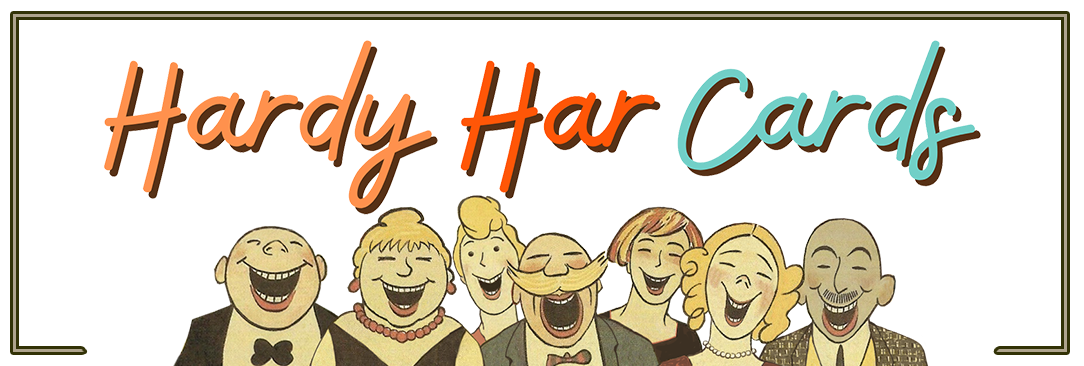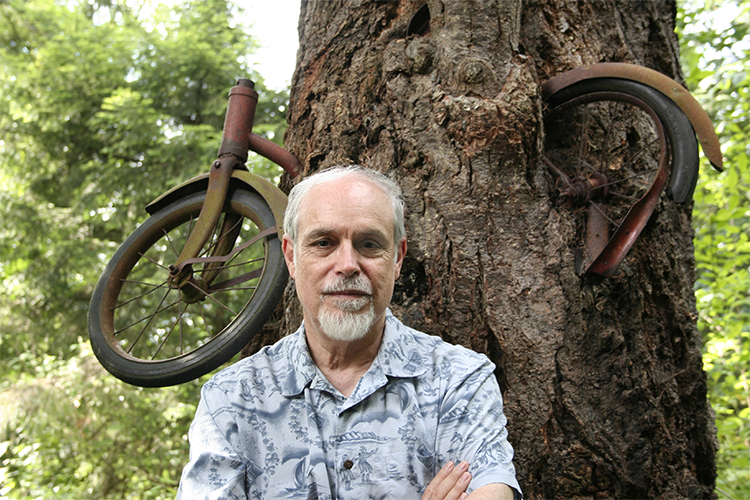Musings on Humor
by Joe McHugh
For as long as I can remember my mother kept a printed bookmark attached to the door of her refrigerator with a magnet that said, “What a person needs most, to make it in this world, is a good sense of humor and a spirit of faith –and in that order.”
Well, that pretty much summed up my mother’s outlook on life—laugh whenever you get the chance because it sure beats tears. And she had her reasons for tears. In 1951, for instance, my father died suddenly from polio leaving her six months pregnant with two young children to take care of. Then my younger brother Patrick died two days after he was born. Devastated by this twin tragedy, I can’t imagine how she managed to survive the dark days, weeks, and months that followed. But survive she did, and my memories of her are of someone who always saw the bright side of life, someone who laughed easily and often. She wasn’t a great teller of jokes but she did possess a special knack for seeing what is funny in the ordinary events of life.
We lived in Paterson, New Jersey, and my mother taught history at one of the inner-city high schools. When I turned eighteen, I underwent an unexpected and, to my family, mysterious transformation. I grew my hair long and took to wearing beads and sandals. Ten months later I dropped out of college because my head was filled with hippie notions about finding the simple life by going “back to the land.” In time this inspired me to purchase a small farm in the hill country of central West Virginia, where I learned how to harness a horse and use it to plow and pull logs out of the woods, grow potatoes and other vegetables, milk goats, and fix shoes, this last thanks to an elderly Italian man in the nearby town who sold me his shoe repair shop and taught me the trade.
And while all this was going on, I began to appreciate the vital role humor played in the lives of my neighbors and customers. Living in that part of the Appalachian Mountains, they’d known their fair share of hard times but, like my mother, they turned to jokes and funny stories to ease the pain and add a dash of enchantment to the humdrum and ordinary. They sometimes even told a joke to get a point across without resorting to insults or blows. I’ll give you an example:
After purchasing my farm, my neighbor Buell Bush stopped by the house to discuss the condition of the fence that separated our respective properties.
“The fence is in poor condition in some places,” Buell said, “and I worry my cattle might get out and end up on your property. So we have to string new wire and replace the rotted fence posts.”
The lone word that struck my ears, however, was “we.” What did a failing fence have to do with me? Other than a dozen chickens, I didn’t keep livestock. Buell on the other hand grazed more than thirty Hertford steers on his land. Then when they were fat enough, he’d take them to the stock auction and sell him. That’s how he made his money. So I reasoned, the fence was his problem, not mine.
“But that’s not how we do things here in Gilmer County,” Buell tried to explain. “The line fence is the responsibility of both property owners whether they have livestock or not.”
My intention was to get along with my neighbors but this kind of logic was lost on me and Buell could tell. So he told me this joke:
God and the Devil were arguing over the line fence between heaven and hell. The Devil would make a demand and God, guided by the generous spirit of cooperation, would give in to the demand. But then the Devil would make a second demand, and a third. No matter how accommodating God was, He couldn’t come to a workable agreement with the Devil over where the fence should be and who should maintain it. At last God reached his limit and he turned his back on the Devil to return to his throne in heaven saying, “Well if that’s how you’re going to be, then I’ll just have to sue you!”
At which the Devil laughed and said, “That’s alright with me, but where do you suppose you’ll find yourself a lawyer?”
Yep, just one more lawyer joke, but it made me laugh. And as I laughed, I understood what Buell was driving at.
“I’d be happy to do my part to get the fence in good shape,” I told him. And we remained close friends from that day on and more than once I turned to him for help or advice and he never let me down.
So why do we laugh when we hear a good joke? Or better yet, what is laughter? As far as I know, very few animals laugh. Cows don’t laugh. Deer don’t laugh. Horses don’t laugh. Cats certainly don’t laugh. Hyenas make a series of high-pitched giggle-like sounds but that isn’t considered laughter because they only do it when they’re threatened or under attack. On the other hand Chimpanzees laugh when they are play wrestling or when they are tickled, although the sound is more of a screech than the laughter of humans. Dolphins, it was discovered by researchers in Sweden, laugh when play-fighting by making a short burst of pulses followed by a whistle. Then there are laughter sounds made by parrots and cockatoos. None of these animals, however, seem capable of laughing at a joke. That appears to be a uniquely human trait.
I had a good friend named Bruce who was a brilliant songwriter, storyteller, poet, and labor historian. His stage name was U. Utah Phillips and one day we were talking about laughter and he likened it to one of those old-fashioned televisions sets, the kind that I grew up with in the 1950s and 60s that used vacuum tubes instead of solid state circuit boards. When you hit the side of one of those television sets with your hand, the picture would go all to hell, the screen filling with random waving lines, until the electrons inside the vacuum tubes settled down and the picture returned to normal.
“Our brains are designed to anticipate certain outcomes,” Bruce said, “to follow a more or less logical train of thought. A joke is a sudden departure from a predictable outcome, the story progressing along one plane of reality and then suddenly veering off at 90 degrees onto a completely new plane of reality, and that’s what makes us laugh. A man walks into a bar with a frog on his head and the bartender says, ‘Hey, where’d you get that?’ And the frog answers, ‘I don’t know. It started as a pimple on my butt.’
“You expect the man to answer the question but the frog does instead, and your brain can’t handle the incongruity. It creates a short circuit, like hitting the side of the television set with your hand, and laughter is the brain and nervous system making a bunch of crazy wavy lines until it can adequately process the information. At least, that’s what I think is going on.”
And the more I search for good jokes to tell, the more what Bruce said makes sense to me. I’m talking about good jokes, the kind of jokes that upend our reliance on predictability in a creative way, not jokes that simply want to put a person or group of people down, or just gross us out.
For over forty years I have been on the lookout for such jokes and, when I find one, I commit it to memory. To do this I must tell the joke to my friends and family members, and not just them, but to complete strangers, such as when I perform on stage. And what I have found is that most people welcome a good joke. Like my mother, they welcome the chance to laugh and, at least for that moment, leave their troubles at the door.
And that’s why her bookmark is now on my refrigerator door, to remind me to keep my priorities straight.
Enjoy the stories! Joe

